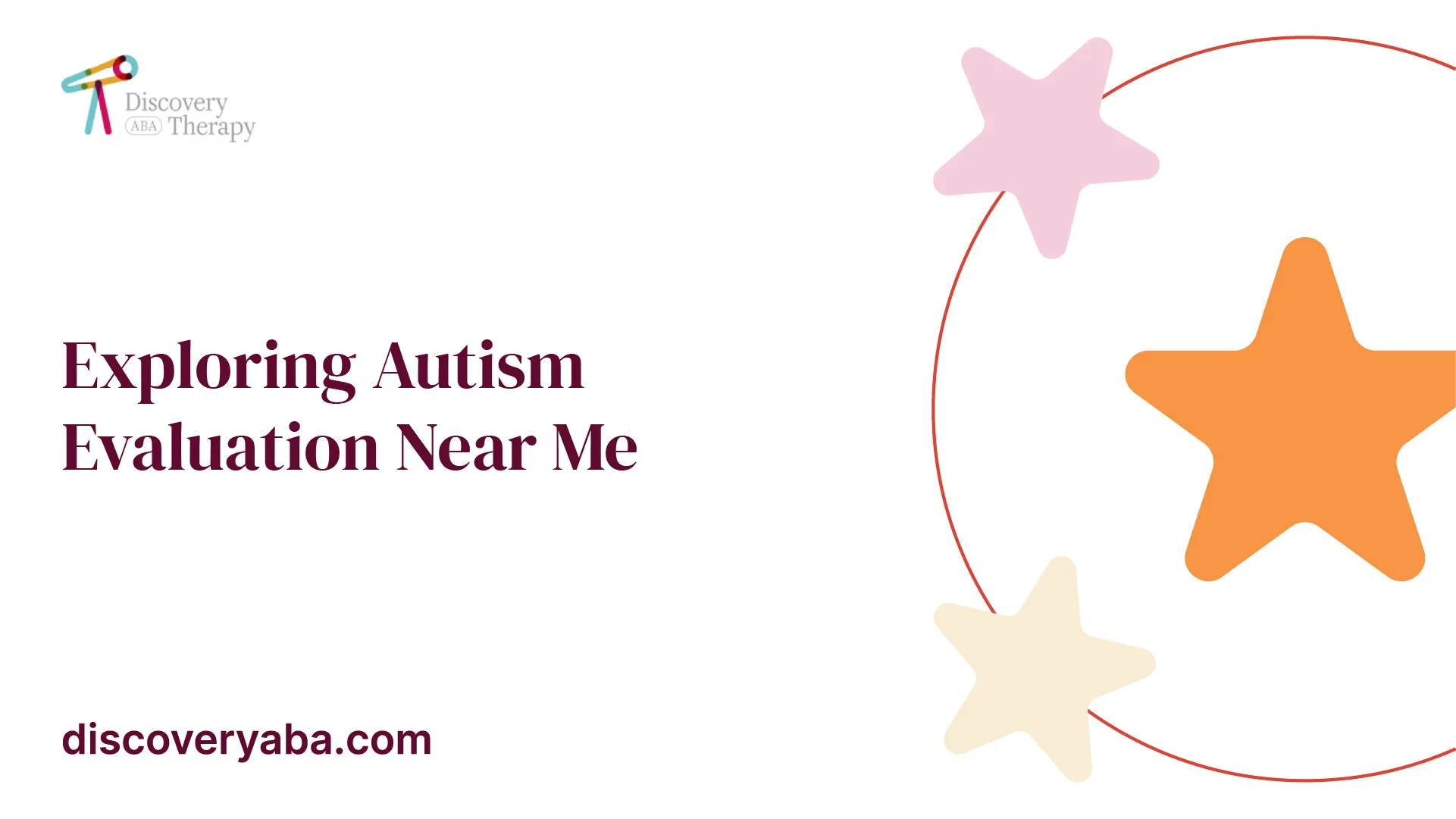Exploring Autism Evaluation Near Me
Discover autism evaluation near you for a comprehensive understanding. Get expert guidance and support on the diagnostic journey.

Understanding Autism Evaluations
Autism evaluations play a crucial role in the diagnosis and understanding of autism spectrum disorder (ASD). These evaluations involve a comprehensive assessment conducted by a team of specialists, such as psychologists, developmental pediatricians, pediatric neurologists, speech-language pathologists, occupational therapists, and other professionals. The process aims to determine if an individual meets the criteria outlined in the Diagnostic and Statistical Manual of Mental Disorders (DSM-5) for autism spectrum disorder.
The Importance of Autism Evaluations
Early detection and evaluation of autism spectrum disorder are critical for implementing interventions and therapies that can improve an individual's quality of life and developmental outcomes. By undergoing an evaluation, individuals with ASD can receive a formal diagnosis, which opens the door to appropriate support services, educational accommodations, and access to tailored interventions. Moreover, evaluations help identify an individual's strengths, weaknesses, and specific support needs, allowing for personalized treatment plans and interventions to be developed.

The Diagnostic Process for Autism
The diagnostic process for autism involves multiple steps to assess an individual's symptoms and behaviors. This process typically includes the following:
- Initial Assessment and Information Gathering: During the initial assessment, professionals gather information through interviews with parents or caregivers. They aim to understand the individual's developmental history, social interactions, communication abilities, and any concerns raised by the family or other caregivers.
- Direct Observation and Behavioral Assessments: Direct observation of the individual's behavior is a crucial part of the evaluation process. Professionals may observe social interactions, play, communication skills, and repetitive behaviors to assess if they align with ASD criteria. Behavioral assessments, such as the Autism Diagnostic Observation Schedule (ADOS), may be used to gather standardized information.
- Standardized Tests and Assessments: Standardized tests and assessments are employed to evaluate cognitive abilities, language skills, adaptive functioning, and other aspects of development. These tests provide valuable insights into an individual's strengths and challenges, helping professionals make an accurate diagnosis.
By combining information from interviews, direct observations, and standardized assessments, professionals can form a comprehensive understanding of an individual's behavior and determine if they meet the criteria for autism spectrum disorder.
Understanding the importance and process of autism evaluations is a crucial first step for individuals seeking a diagnosis or further understanding of autism. It enables access to appropriate interventions, support services, and resources that can positively impact their lives.
What to Expect in an Autism Evaluation
When undergoing an autism evaluation, it is important to understand the process and what to expect. Autism evaluation centers specialize in conducting comprehensive evaluations to determine if an individual meets the criteria for an autism diagnosis. These evaluations involve gathering information through various methods, such as interviews, observations, and standardized assessments, to assess the presence and severity of Autism Spectrum Disorder (ASD) symptoms.
Initial Assessment and Information Gathering
The evaluation process typically begins with an initial assessment and information gathering. This phase involves interviews with parents or caregivers to gather a detailed history of the individual's development, behaviors, and any concerns. The evaluator may ask questions about the individual's milestones, social interactions, communication skills, and sensory sensitivities. This information helps to establish a comprehensive understanding of the individual's background and aids in the evaluation process.
Direct Observation and Behavioral Assessments
Direct observation is a crucial part of the autism evaluation process. The evaluator may directly observe the individual in various settings, such as at home, school, or during therapy sessions. This allows the evaluator to assess the individual's social interactions, communication abilities, play skills, and behavior in different contexts. Observations provide valuable insights into the individual's strengths, weaknesses, and behavioral patterns.
In addition to observations, behavioral assessments may be conducted. These assessments involve using standardized questionnaires and rating scales to gather information about the individual's behaviors and symptoms. These tools help to assess the presence and severity of ASD symptoms, as well as any associated difficulties.
Standardized Tests and Assessments
Standardized tests and assessments play a significant role in autism evaluations. These tests are designed to assess various aspects of development, including cognitive abilities, language skills, social interactions, and adaptive functioning. The evaluator administers these tests and assesses the individual's performance to gain a comprehensive understanding of their strengths and weaknesses.
It is important to note that the evaluation process may involve multiple specialists working together as a team. These specialists can include psychologists, developmental pediatricians, pediatric neurologists, speech-language pathologists, occupational therapists, and other professionals with expertise in autism evaluation. Their collective expertise helps to ensure a thorough and accurate assessment of the individual's symptoms and behaviors.
The goal of an autism evaluation is to determine if the individual meets the criteria for Autism Spectrum Disorder outlined in the Diagnostic and Statistical Manual of Mental Disorders (DSM-5). Additionally, the evaluation aims to identify the individual's strengths, weaknesses, and support needs [1]. Early detection and evaluation of autism spectrum disorder are crucial for implementing interventions and therapies that can improve the individual's quality of life and developmental outcomes.
Understanding the process and what to expect in an autism evaluation can help individuals and their families navigate the journey towards an accurate diagnosis and access appropriate support and interventions.
Finding an Autism Evaluation Center
When seeking an autism evaluation, it is important to find a reliable and reputable evaluation center that can provide comprehensive assessments. Luckily, there are various resources available to help individuals find an autism evaluation center that meets their needs.
Local Resources and Support Organizations
Local resources and support organizations can be valuable sources of information when searching for an autism evaluation center. These organizations often have extensive knowledge of local services and can provide recommendations based on their experience and expertise. One such organization is Autism Speaks, which offers a variety of resources, including a tool to help individuals find local support groups and autism evaluation centers near them. By utilizing these resources, individuals can connect with experts and gain insights into evaluation centers in their area.
Autism Evaluation Centers Near Me
Autism evaluation centers are dedicated facilities that specialize in diagnosing autism spectrum disorders. These centers employ professionals with expertise in evaluating and diagnosing autism. By conducting a search for "autism evaluation near me," individuals can identify evaluation centers in their vicinity. Hopebridge is one such organization that provides autism evaluations in various locations, making it convenient for families to find a center close to them [4].
Online Tools for Finding Evaluations
In addition to local resources and evaluation centers, online tools can assist individuals in finding autism evaluation centers near them. Autism Speaks offers an online resource directory that allows individuals to search for local autism-related resources and organizations, including evaluation centers. By entering their location into the online tool, individuals can access information about evaluations, support groups, and other autism-related services available in their community.
Utilizing these online tools and resources can help individuals and families find the most suitable autism evaluation center near them. It is important to consider factors such as the center's expertise, the qualifications of professionals, and the services they offer. By conducting thorough research and seeking recommendations from local resources and organizations, individuals can make informed decisions and find an autism evaluation center that meets their specific needs.
The Cost of Autism Evaluations
When considering an autism evaluation, it's important to understand the potential costs involved. The cost of an autism evaluation can vary depending on several factors, including location, type of professionals involved, and specific services required.
Insurance Coverage for Autism Evaluations
Insurance coverage for autism testing can vary widely depending on the individual's insurance plan and specific circumstances. Some insurance plans may cover a portion or all of the costs associated with autism testing, including evaluations by specialists such as psychologists, psychiatrists, and therapists. It's recommended to contact your insurance provider to determine the extent of coverage for autism evaluations and any associated requirements or limitations.
Out-of-Pocket Expenses for Autism Evaluations
Out-of-pocket expenses for autism testing can also vary depending on factors such as location, type of professionals involved, and specific services required. Informal autism screenings can range from $0 to $500, while formal diagnostic tests can cost up to $5,000, depending on the method of screening, insurance coverage, and the facility visited. Diagnostic evaluations tend to be more expensive than general screening checklists and questionnaires, with costs ranging from $800 to $5,000, depending on the clinic visited.
It's important to note that these costs are general estimates and may vary based on geographic location, professional fees, and the specific services provided. Different regions and healthcare providers may have different pricing structures for autism evaluations.
Factors Affecting the Cost of Evaluations
Several factors can influence the cost of autism evaluations. These factors include:
- Geographic Location: The cost of evaluations may vary based on the region and healthcare provider. Urban areas and specialized clinics may have higher costs compared to rural areas.
- Type of Professionals Involved: The involvement of various professionals, such as psychologists, psychiatrists, and therapists, can impact the overall cost of the evaluation.
- Specific Services Required: The specific assessments, tests, and additional services needed for the evaluation can contribute to the overall cost. Additional services may include speech therapy, occupational therapy, or cognitive assessments.
It's essential to consult with the evaluation center or healthcare provider directly to obtain a more accurate estimate of the costs associated with an autism evaluation. They can provide detailed information about the specific services offered, associated fees, and any available financial assistance options.
Understanding the potential costs involved in autism evaluations can help individuals and families make informed decisions regarding their healthcare and access to necessary evaluations and support.
References
- https://www.myteamaba.com/resources/autism-evaluation-centers
- https://www.autismspeaks.org/finding-your-community
- https://www.hopebridge.com/faqs/
- https://www.crossrivertherapy.com/autism/evaluation-and-screening-costs
- https://www.talktomira.com/post/how-much-does-an-autism-screening-cost-without-insurance
Does Your Child Have An Autism Diagnosis?
Learn More About How ABA Therapy Can Help
Find More Articles
Contact us
North Carolina, Nevada, Utah, Virginia
New Hampshire, Maine
Arizona, Colorado, Georgia, New Mexico, Oklahoma, Texas
.avif)




































































































